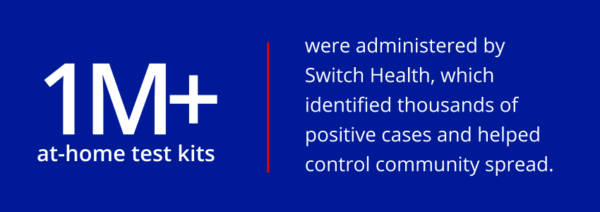Last updated: June 21, 2022
Ask an Expert: Evolving Healthcare Solutions for the Road Ahead
Jason HernDirector, Healthcare
Jason is Purolator’s leading healthcare solutions expert with extensive experience in supply chain management, specialized transportation and logistics. His proven record of leading innovative, customer-centric initiatives to drive bottom-line results also includes solutions for the pharmaceutical, retail, consumer packaged goods, agricultural, eCommerce, and high-tech industries.
When COVID-19 first emerged, the healthcare industry was in the spotlight as it faced disruption and transformation. In this segment of our Ask An Expert series, Jason tackles the challenges and opportunities posed by the ongoing pandemic. He shares his thoughts on the latest healthcare solutions, as well as future changes awaiting the industry, including the increasing role of the federal government.
What you’ll learn…
-
-
-
-
- What has been COVID-19’s biggest impact on the healthcare industry’s supply chain?
- What’s the main concern of healthcare customers due to supply chain challenges?
- What in your opinion will be the longer-term changes to the industry?
- What makes shipping healthcare supplies a unique challenge for a delivery provider?
- What healthcare solutions did Purolator provide during the crisis?
- What is Purolator doing differently for its healthcare customers?
- Any advice for those navigating healthcare solutions at this time?
- What has been COVID-19’s biggest impact on the healthcare industry’s supply chain?
-
-
-
What has been COVID-19’s biggest impact on the healthcare industry’s supply chain?
The fact that most of our medical supplies are produced offshore has been significant. Canada is in competition with dozens of nations for the same products, which are being made by a limited number of suppliers. Often these products are manufactured in Asia, Europe, and increasingly India, resulting in longer transit times and expensive air shipments.
In addition, the law of supply and demand kicks in, so we’re seeing countries, including our own, paying far more for certain supplies than we would during “normal” times.
In my opinion, the industry has not coped well. Without the concerted effort of Health Canada to bring supplies from China, there would have been a larger supply issue.
What’s the main concern of healthcare customers due to supply chain challenges?
Spurred by the pandemic, the FDA reports that there is a shortage of select medical devices. If you think about it, supply chain challenges being a “matter of life and death” isn’t an exaggeration! If anything, the pandemic has simply underscored the critical role played by the world’s healthcare companies. Now more than ever, there are considerations to ensure that you can follow best practices when it comes to medical supplies.
In addition, it is essential to have a trusted logistics partner that can quickly reach every point across the country. This will help to lessen the impact on your patients and customers when the up-stream supply chain gets disrupted.
What in your opinion will be the longer-term changes to the industry?
The future will be very interesting. All signs point to a major push to near-shore manufacturing of critical medical supplies.
Also, not insignificantly, there will likely be an increasing government role in the months ahead. For instance, Canada’s Essential Services Contingency Reserve (ESCR), provides eligible businesses and organizations with access to personal protective equipment (PPE) and critical supplies to address urgent needs. This governmental role will likely extend to the manufacturing of critical medical devices and drugs including vaccines.
While there is vaccine manufacturing here in Canada, these companies are often headquartered outside of the country. By creating proprietary arrangements with manufacturers, our government can ensure that Canadians are among the first benefactors in a time of crisis.
The pandemic has also taught us that being prepared for unexpected events is essential. Be it events like war or climate change, these events can have a ripple effect on manufactures and suppliers. That’s where having a nimble supply chain built with speed, reliance and reach comes in.
Having a shipping partner that can help you safeguard medical supplies for shipping and receiving is a must.
All of these changes will require highly customized healthcare solutions that reflect each customer’s unique needs.
What makes shipping healthcare supplies a unique challenge for a delivery provider?
Most healthcare supplies are manufactured outside of the country, so there’s always the potential for strained supply chains. But we get a lot of our clothing, toys, appliances and electronics from there, so that doesn’t necessarily make healthcare distinct.
What defines good healthcare solutions are the dual needs for reliability and speed. There are several delivery services that are absolutely instrumental to supporting healthcare companies, such as temperature control to ensure product efficacy, real-time tracking to ensure optimal visibility and security, in addition of course, to expedited shipping to accommodate time-definite deliveries.
For the most time-sensitive shipments, Purolator offers a Mission Critical service which is our fastest shipping service to date. We ensure that the best route is taken for deliveries where every minute counts. Our customers have peace of mind knowing that this service comes with expedited shipping, enhanced tracking visibility and 24/7 access to Mission Critical specialists.
What healthcare solutions did Purolator provide during the crisis?
Shortly after the outbreak, our Global Supply Chain Solutions and Purolator International teams began to build creative solutions to import critical medical supplies from overseas and the U.S.
We introduced priority service for all healthcare-related products specifically to address the urgent need for PPE. Every step of our delivery process was reviewed and assessed. That prioritization was executed across all business units – not just within our courier network.
Through our partnership with Health Canada, we’ve delivered to every hospital and care facility in the country. Before we began to ship medical supplies like respiratory devices, diagnostic equipment, masks, gloves and gowns, our Global Supply Chain Solutions team developed creative direct-to-hospital and long-term care facilities express solutions to reduce the time needed to get these critical products to the front line.
We also partnered with Switch Health, a health tech consultancy, who early in the pandemic conceptualized a program to deliver at-home COVID-19 test kits. With this program, more people could avoid gathering at clinics while still getting access to important health information. To distribute their test kits, Switch Health needed a shipping partner that could provide the fastest shipping times, offer extended reach across Canada, meet high safety standards and have proper dangerous goods training.
By combining Purolator’s extensive shipping network and Mission Critical service, we created a customized shipping solution in just 10 days that could reach all of Switch Health’s patients. Switch Health administered over 1 million at-home test kits which identified thousands of positive cases and helped control community spread.
We also responded by working with our medical device customers to align all suppliers to a set of accepted safe delivery procedures, including contactless delivery and deliver-to-dock rather than room-to-room within healthcare facilities. These were implemented not only to protect our employees, but also everyone in the many communities we serve.
What is Purolator doing differently for its healthcare customers?
We provide several healthcare solutions that directly answer the needs of healthcare professionals and their customers. Like with Switch Health, we partner with customers to find the ideal solution to fit their needs.
We are accepting air/ocean containers and LTL or full truck-load shipments at any point of entry into Canada. Full shipments can be broken down and relabelled into essential items and then expedited to direct-to-consumers, hospitals or clinics and bypass the need for distribution centre processing. We can also create a healthcare solution that includes a custom distribution plan for the rest of the shipment to meet the customer’s business needs.
Non-priority items can be warehoused so they do not clog critical pathways to end consumers.
We launched a prioritization initiative integrating unique Healthcare stickers and red pack product dedicated to healthcare customers only. This helps to easily identify healthcare shipments to keep them quickly moving through the network.
A key part of our offering is our enhanced healthcare digital indicator. This solution essentially digitizes every Express healthcare shipment in our network, allowing for prioritization starting at induction all the way to our driver handhelds. Using this solution we are able to maintain consistent priority and elevated visibility for healthcare shipments.
Any advice for those navigating healthcare solutions at this time?
The supply chain is changing quickly and constantly. So too must healthcare solutions. Find time each day to anticipate and plan for the things you can control.
Stay close to your patients and customers, informing them of critical changes in your network. Don’t hesitate sharing bad news as well as good news. It’s been my experience that everyone wants to be comfortable and engaged in the changing climate. Transparency is one of the pillars of a solid relationship.
Any final thoughts to share with our healthcare customers?
Yes! I want to thank our healthcare customers. Unlike any other time in recent history, healthcare is playing a central role in the lives of all Canadians. We feel privileged to be part of that success story.
Our commitment to serving our healthcare customers has absolutely galvanized all of Purolator. Our promise of OTP (on-time performance) remains consistent and steadfast, as does our long-term plan to adjust with changing needs brought on by COVID-19.


